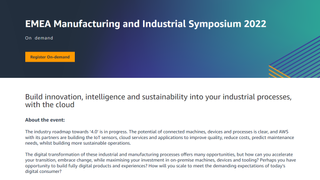Giving Gen-Z staff a clear purpose can advance business growth, sustainability
The demands of new workers and the new economic environment can be solved together, by businesses willing to innovate and foster a working culture

Businesses must foster Gen-Z’s sense of meaning through important goals such as sustainability targets, in order to maintain competitiveness and spur growth, according to industry experts.

Build innovation, intelligence and sustainability into your industrial processes, with the cloud
EMEA Manufacturing & Industrial Symposium 2022
In order to attract young talent, businesses should choose to offer roles in which individuals feel like they’re making a difference to the world, and maintain a culture of communication, business leaders have suggested. Organisations that follow this, and foster a culture that supports overlaps with sustainability schemes, could future-proof their business strategies and remain competitive in a market increasingly reliant on new talent.
Younger workers require a clear understanding of the moral value in their job, and sustainability schemes that include contributions from individual employees could fill this need. As Gartner recently identified sustainability as the key tech trend for 2023, and businesses increasingly bet on sustainability to tackle disruption, the field could offer returns in both investment and employee satisfaction.
However, sustainability schemes that amount to little more than greenwashing can be met with negativity and a feeling that the organisation in question lacks the trust in its employees to be transparent.
Alongside purpose, young workers increasingly demand honesty from employers, so maintaining a young workforce amidst growing drives for net zero carbon will require a transparent approach.
At a roundtable discussion, representatives from Dell, Red Hat, and Kyndryl spoke to a changing strategy in hybrid cloud, driven in part by the onboarding of younger workers, and gave examples of tasks that can meet these demands.
“It’s got to be something we can bring to life, and imagine,” said Tosca Colangeli, UK and Ireland president at Kyndryl.
Get the ITPro. daily newsletter
Receive our latest news, industry updates, featured resources and more. Sign up today to receive our FREE report on AI cyber crime & security - newly updated for 2024.
“When we launched Kyndryl, we joined up with One Tree Planted, and for every employee that we had, we planted a tree. We wanted to do that to recognise the importance of the environment, and we all voted for One Tree Planted; choice is part of the cultural shift - it’s important on a personal level to be able to contribute.”
Firms were also urged to use clear language in order to communicate the effectiveness of schemes such as those implemented to reduce energy demand. For younger workers, this can feed into the wider needs for transparency and a sense of progress in work, but it can also prove the value of environmental, social, and governance (ESG) schemes to C-suite executives.
“They're super intelligent people, but they're not experts in zettabytes and kilowatt hours,” Dayne Turbitt, UK general manager and SVP at Dell.
“So, if you put it in context for them, in terms such as “by doing this, you save as much electricity as a million houses”, that really brings it home.”
Members of the panel said the shift in generational priorities has happened alongside a gradual slowing of growth in the cloud market, as businesses have begun to take stock of the systems they have in place before expanding further.
“There’s a period of consolidation now, which says “how do I manage these costs I have?”, said Colangeli.
“There's economic pressure, there's a demand for real-time information... the real prize is about the data we're unlocking in the cloud, and that's what we're really seeing coming to life right now, around artificial intelligence (AI) and insights. We're going to get from having all of this data in the cloud.
“You're going to have to get your house in order. You're gonna have to get some control over the cost, so you can reinvest in the data and the insights that really will game-change your organisation.”
Increased automation, whether in the back office or through robotic process automation (RPA) systems that share tasks with human workers, is one cost-effective way for businesses to maintain efficiency amidst economic downturn.
If implemented correctly, automation can also be used to improve employee experience, allowing workers to get on with more meaningful work in lieu of tiresome manual processes.
“The case for the return on investment and the case of the environment have never been closer,” Simon Wright, director, strategic solutions team at Red Hat UK.
“It’s the small gains, and I think automation and self-service are two key things which will help drive us in the right direction.”
Microsoft and Kyndryl announced an expansion to their strategic partnership in October, with the aim of helping customers improve mainframe data access. Dell and Red Hat continue to work closely on containerisation, and the Dell APEX consumption model to improve customer scalability in a landscape increasingly demanding real-time reaction to macroeconomic shifts.

Rory Bathgate is Features and Multimedia Editor at ITPro, overseeing all in-depth content and case studies. He can also be found co-hosting the ITPro Podcast with Jane McCallion, swapping a keyboard for a microphone to discuss the latest learnings with thought leaders from across the tech sector.
In his free time, Rory enjoys photography, video editing, and good science fiction. After graduating from the University of Kent with a BA in English and American Literature, Rory undertook an MA in Eighteenth-Century Studies at King’s College London. He joined ITPro in 2022 as a graduate, following four years in student journalism. You can contact Rory at rory.bathgate@futurenet.com or on LinkedIn.




